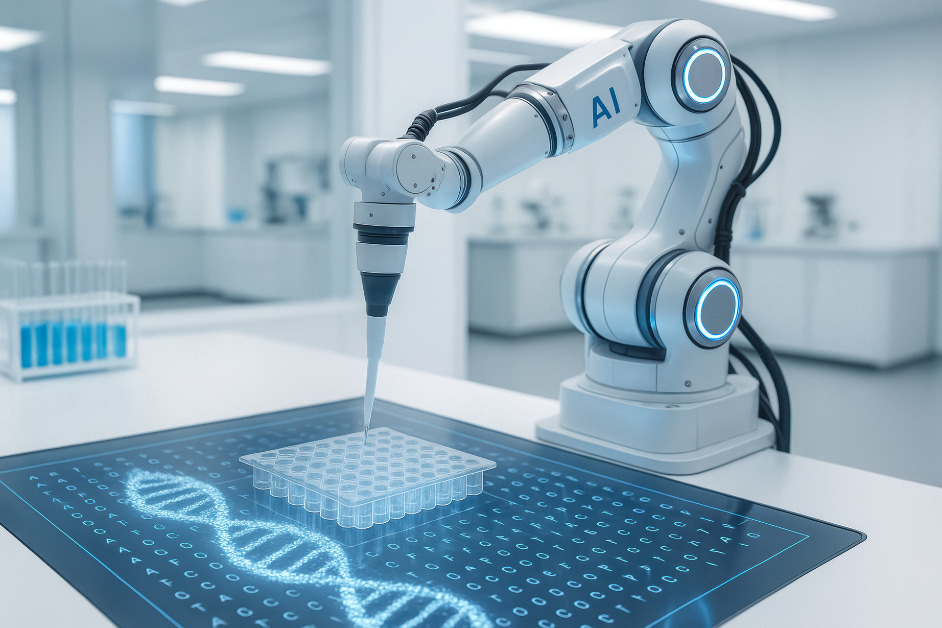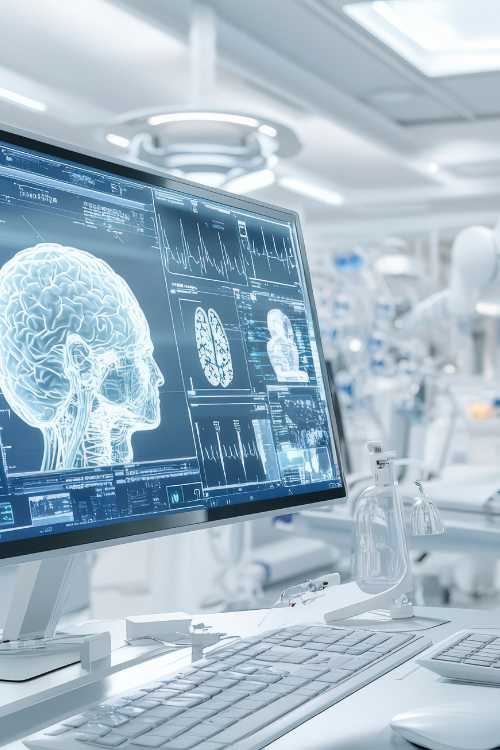Can machines replace humans? This question is preoccupying employees and companies across all industries. Up to 12 million job changes are expected by 2030, which is why McKinsey has proclaimed a new future of work. The reason for this is the major transformation brought about by artificial intelligence (AI), the use of robotics and increasing automation.
For the life sciences industry, which was an early adopter of digital transformation, this means rethinking research and development, production and supply chains, as well as sales and consulting (see also here). On the other hand, it can reinforce the feeling among employees that they are living in a BANI world that is fundamentally perceived as fragile and uncertain.
This article describes how the life sciences industry can face this transformation process in order to successfully prepare employees for the future use of automation and AI.
Automation, robotics and artificial intelligence in the life sciences industry – three pillars of transformation
The automation of manufacturing processes in the pharmaceutical industry began at the start of the last century and continued in the 1950s with the use of the first robots. As in the entire life sciences industry, the advantages of automation lie primarily in the acceleration of manufacturing, the precise repeatability of processes and the resulting standardisation.
Automation describes the overarching process in which processes are carried out without human intervention. Robotics represents the physical component, while AI makes the systems intelligent and capable of learning.
Laboratory 4.0 in the pharmaceutical industry and biotechnology
The special conditions that apply in the life sciences industry in research and production, for example due to clean room suitability and approval requirements, make automation one of the most demanding disciplines in this field. At the same time, it is a promising market that is expected to grow by almost 14% by 2034 for pharmaceutical robotics, for example. Through the use of AI and machine learning, robots can increasingly take on the role of researchers, as is already the case in chemistry, for example. Researchers with long working hours and a lot of patience. The time savings and smooth analysis of large amounts of data offer human researchers the opportunity to focus more on interpreting the results (automation in the pharmaceutical industry: innovation & efficiency) and development.
Through the use of the Industrial Internet of Things (IIoT) and machine learning, an entire laboratory can be operated largely autonomously and around the clock.
Laboratory 4.0 is powered by Agentic AI, which makes decisions independently and can analyse and process large amounts of data in a very short time.
Impact on employment
The physically repetitive tasks that have already been replaced by robot-based automation can now be extended to professions with cognitive and highly skilled tasks through the use of AI.
McKinsey estimates that up to 3 million jobs across all industries and throughout Germany could be affected by this change. For the life sciences industry, this means that almost all areas – from warehousing and supply chains to regulations and compliance issues to research and development – can be supported or even partially replaced by (generative) AI in the future, enabling faster and more precise processes. According to McKinsey, a productivity boost of 3% is possible. However, certain prerequisites are necessary for the use of AI. On the one hand, many workers will need to reorient themselves from shrinking to growing occupational fields.
In particular, there will be an increase in demand for technological skills – as well as emotional and social skills. AI developers, machine learning engineers, data analysts and online marketing experts will be in greater demand and can be recruited with the help of professional HR consulting. Human skills are needed both for the competent use of technology and for interpersonal tasks, such as leadership and collaboration.
Necessity of change management
On the other hand, the workforce must be introduced to new ways of working through targeted change management. Given the specific requirements of the pharmaceutical industry with its complex data and regulatory regulations, employees must work together. Managers should therefore develop a strategic roadmap that prioritises key measures and actively shapes change.
Important factors include, for example:
- Transparent communication
- Systematic upskilling programmes, which can also be carried out using VR, for example
- Internal talent development
- Retraining
- Allowing time for the transformation process
Risks
There are numerous advantages to digitalisation and automation in the life sciences industry. However, apart from the fact that around 70% of transformation projects fail due to a lack of investment, a lack of skills or excessive objectives, the associated risks should also be taken into account. Data security and data protection are becoming increasingly important, especially when dealing with sensitive data in the pharmaceutical industry. Industrial espionage by hackers is a risk that should not be underestimated. At the same time, the increasing interconnectedness of different applications can lead to errors and failures that can be very complex to analyse and rectify. In this area, too, companies should clearly communicate the potential dangers to their workforce and hire the right personnel. At the same time, the uncertainties associated with the use of generative AI and large language models (LLMs) should not be underestimated – especially when AI generates incorrect information (‘hallucinations’) or presents content in a manipulative way.
For the workforce, every transformation also means stress. Mental strain can arise both from excessive use of digital applications and from concerns about being replaced by machines. Companies should therefore proactively address ethical issues in dealing with data and employees and develop clear guidelines.
Conclusion
The transformation through the use of AI in automation has already begun in the life sciences industry as an early adopter. It offers numerous advantages – from time savings and greater precision and future viability to new opportunities in research. As this change is very comprehensive and affects all employees of a company, it should be designed carefully and strategically. Open personnel communication, as explained here, using the example of a hospital, helps to involve the workforce and keep the company attractive to the outside world. For retraining and upskilling, the support of a personnel consultancy can be useful so that employees see openness to technology as an opportunity rather than a threat. Human skills such as empathy and leadership qualities are also crucial for successful change management. A personnel consultancy can provide professional support throughout the entire process.






